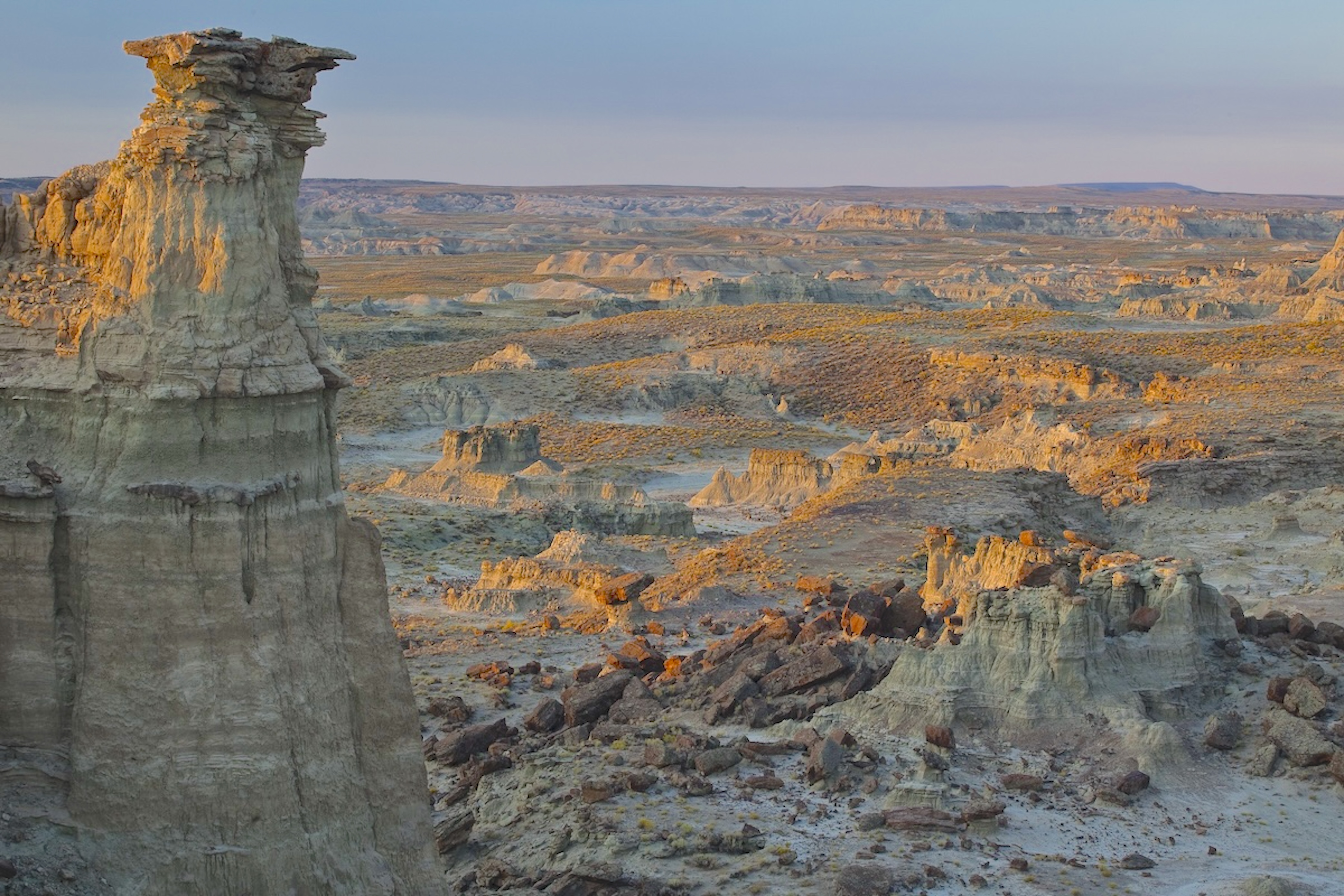Hageman’s Rock Springs bill undermines public input, federal official says

Adobe Town, a wilderness study area, would be protected in the Rock Springs Area Resource Management Plan revision as an area of critical environmental concern, one of 16 such designations in the BLM proposal. (Bob Wick/BLM)
FROM WYOFILE:
Measure to stop BLM from completing 3.7M acre plan won’t get to Biden’s desk, Dem leader says.
U.S. Rep. Harriet Hageman’s bill to block plans to manage 3.7 million federal acres in southwest Wyoming undermines the public’s right to participate, a U.S. Bureau of Land Management official said last week.
BLM Principal Deputy Director Nada Wolff Culver made those comments to the House Subcommittee on Federal Lands, where she testified on Hageman’s H.R. 6085, which would prohibit implementation of the Rock Springs resource plan revision. The BLM proposed a conservation alternative for the high steppe country between the Wind River Range and Rock Springs.
Wyoming communities dependent on oil and gas drilling, mining, grazing and other uses say the conservation alternative would harm their economy and lives. They charge the government with not engaging affected communities enough and then choosing a plan they disfavored.
The BLM “strongly opposes” Hageman’s bill that would block any plan, Wolff Culver said. The conservation alternative would safeguard valuable wildlife habitat, including the richest greater sage grouse habitat in the world, she said. Migration routes for pronghorn and deer traverse the area.
H.R. 6085 “would undermine the public’s right to provide input on the management of public lands, as well as the BLM’s ability to steward them,” she told the subcommittee.
Evaluating comments
The BLM has accepted public input and is in the process of evaluating comments as it finalizes the Rock Springs Area Resource Management Plan Revision, Wolff Culver told the panel. At Gov. Mark Gordon’s request, the BLM extended the comment period. Interested parties had about five months to weigh in, she said.
“All of these efforts are already underway,” she said of BLM’s outreach, “reflecting thousands of hours of engagement by many people who care about their public lands.”
Hageman, a Republican, has called the proposed BLM plan “an illegal land grab.” But the plan — and another that’s being challenged by U.S. Rep. Lauren Boebert (R-Colorado) — grew from the agency’s adherence to federal laws, Wolff Culver said.
“These [Hageman and Boebert] bills contravene [the Federal Land Policy Management Act] and would prevent the BLM from managing public land resources on millions of acres,” Wolff Culver said.
Conservationists oppose Hageman’s bill, Julia Stuble, Wyoming state senior manager for The Wilderness Society, told WyoFile.
“We know BLM is seriously considering [changes] and will be making adjustments,” she said of the planning process. “It just doesn’t make sense at this stage to get in the way of that.”
The leading Democrat on the committee, U.S. Rep. Joe Neguse (D-Colorado), observed that Hagemen was absent for Wolff Culver’s testimony.
“It’s a shame our colleague from Wyoming isn’t here,” he said as he questioned the BLM official about public engagement. Area residents want that engagement with the BLM to continue, a Rock Springs area representative said.
“We have long worked with the BLM to balance productive uses of federal lands, including solid conservation efforts,” Sweetwater County Land Use Director Eric Bingham told the panel. “Cooperators are amenable to sitting at the table with the BLM to engage in a collaborative process to develop a plan that balances multiple uses.”
Three Wyoming lawmakers and a county commissioner opened a dialog with BLM director Tracy Stone Manning in Washington D.C. earlier this month, advocating for grazing, mining and other uses, according to the Rocket Miner. They will continue to engage state BLM officials as the plan is finalized, the Rock Springs news site reported.
As it developed the plan, the BLM told cooperators that the conservation alternative was one of two “bookend” alternatives, the other bookend favoring development. Starting in 2017, local collaborators and the BLM worked mostly on a compromise plan they were told would be the preferred path, Bingham said.
The BLM chose the conservation option last year.
“This dramatic shift … negates the decade-long collaboration efforts of both BLM and cooperating agencies,” he said. If adopted, the conservation alternative would prevent development of a new trona mine and cripple oil and gas production with a corresponding impact to tax revenues and communities at large, he said.
Stuble, with The Wilderness Society, said the plan will likely change to accommodate local interests.
“Clearly Sweetwater County is going to depend on mineral extraction in the future,” she said. “The decisions in the [Resource Management Plan] don’t preclude that. Existing production and mining will continue and expand.”
Bill is doomed
Even if Hageman sees some success in advancing her measure, it likely won’t become law, Democrat Neguse said.
“I don’t think it is ultimately going to get to the president’s desk,” the Colorado representative told Wolff Culver and the committee.
“I just hope that this is not par for the course and doesn’t become standard practice over here,” he said of Hageman’s process-stopping bill. “Your door has always been open,” he told Wolff Culver, “and members are free to engage you in these processes rather than introducing legislation to stop it in its tracks.”
WyoFile is an independent nonprofit news organization focused on Wyoming people, places and policy.
This story was posted on March 27, 2024.







